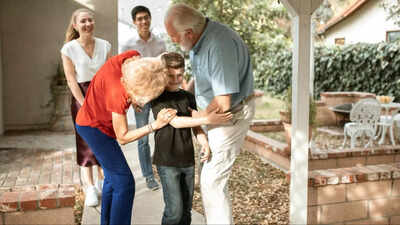ARTICLE AD BOX

Grandparents and parenting: Emotional anchors or rule-breakers? (Image: Pexels)
Multigenerational households and frequent grandparent involvement are increasingly common worldwide and it comes packed with enormous benefits that include extra care, cultural transmission and resilience during crisis but it also raises real questions: who sets limits, which rules get enforced and how do parents avoid tension without sidelining grandparents? Grandparental childcare has grown in many countries (for economic, cultural, and pandemic-related reasons), so families increasingly face everyday intergenerational coordination issues that affect children’s development and family well-being.
That context makes finding workable rules and roles critical.
Key benefits documented by research
- Extra caregiving is linked to better child resilience and social support: As per a 2020 study published in ScienceDirect, closeness to grandparents acted as a resilience factor and moderated the association between parental conflict and child-quality-of-life. Multiple studies show that when grandparents are emotionally close and open to supportive conversation, they act as buffers for children exposed to family stress (divorce, parental conflict). In short, reliable grandparental support often protects child wellbeing when parents face strain.
- Multigenerational childhoods can predict long-term cognitive and social advantages: Individuals who grow up in multigenerational households show higher levels of cognitive functioning across adulthood. Longitudinal analyses associate growing up with multiple adult caregivers — including grandparents — with certain later-life cognitive advantages, perhaps because of richer social environments and diverse stimulation early on. This is evidence that extra adults in the home can add developmental value beyond sheer childcare.
- Grandparental involvement supports culture, identity and life satisfaction: Grandparents pass on familial stories, cultural practices and emotional continuity, which is important for identity formation and long-term relationship satisfaction. In many families, grandparents give children a sense of rootedness.

Love, discipline and tension: Inside today’s grandparent-parent tug of war (Image: Pexels)
Why conflicts happen
- Generational differences in norms and knowledge: Grandparents may rely on practices (food, sleep, discipline) that parents no longer prefer and research shows this mismatch is a frequent source of tension.
- Role ambiguity: In the absence of clear co-parenting agreements, grandparents may “fill gaps” in ways that undermine parents’ rules, increasing friction and inconsistent messaging for children. Evidence links better intergenerational coparenting to better child outcomes.
- Stress and resource constraints: In families where parents lean on grandparents because of economic or work strain, the added pressure can amplify misunderstandings and burnout on all sides. Research on multigenerational households during crises (e.g., pandemic) shows both resilience and additional risk when demands are unmanaged.

The blessing and the battle: When grandparents help raise kids (Image: Pexels)
Tips to keep the blessing and avoid the battle
- Hold a short “coparenting charter” conversation (then repeat it): A brief charter of 10–15 minutes can cover non-negotiables (sleep, safety, medical rules) and negotiables (treats, outings) to create clarity and reduce conflict. Revisit after major transitions (new school, toddler-to-child changes).
- Use the “two-question rule” before correcting a grandchild in public: Role ambiguity and public corrections increase resentment. Instead of instant correction, parents can ask: “Is it urgent?” and “Can we debrief later?” This keeps authority intact without embarrassing helpers.
- Teach grandparents the why (not just the what): Brief, respectful education works. Parents and grandparents disagree partly because practices change. Short, empathy-forward explanations (“Paediatric guidelines now say… because…”) reduce perceived affronts and help grandparents comply without feeling dismissed. Use reputable one-page guides or a paediatrician's note when needed.
- Protect grandparent wellbeing: Assess caregiving load annually. Intensive caregiving can harm some grandparents’ health. If a grandparent is the primary daytime caregiver, check physical and emotional load and offer support or respite to avoid burnout or health decline.
- Create “micro-roles”: For example: meal-helper, drop-off buddy, storytelling hour rather than open-ended caregiving. Role clarity reduces friction and preserves grandparents’ dignity. It capitalises on benefits (cultural transmission, emotional closeness) while limiting boundary creep.
When families get the roles, rules and resources right, grandparent involvement is overwhelmingly a blessing. It supports children’s resilience, transmits cultural capital and helps parents manage work and life. The research is clear that alignment (coparenting), ongoing negotiation and attention to grandparents’ health turn potential boundary battles into durable family strengths. If disagreements arise, short, respectful conversations grounded in clear rules and, when needed, a neutral third party produce the best outcomes for children and adults alike.



.png)
.png)
.png)
















 1 day ago
3
1 day ago
3









 English (US) ·
English (US) ·